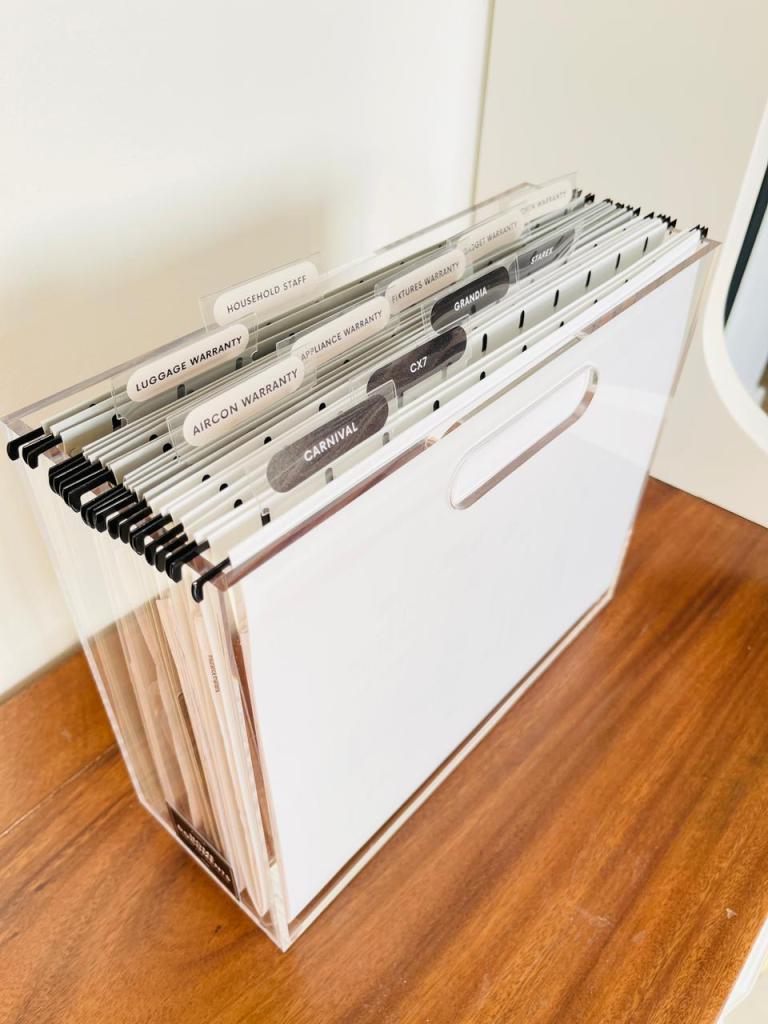How are you doing with your paper organization so far? What has been your biggest takeaway from my last two blogs on paper organization?
This is the third of the four-part blog series on organizing papers. In this blog, we will discuss organizing papers for the household.
I’ve always said that homemaking goes beyond “what is seen” – the cooking, cleaning, organizing, doing the laundry, and folding clothes. These are all essential in keeping the household happy and healthy every day, but a homemaker also deals with “what is not usually seen” – the budgeting, keeping track of expenses, paying the bills, and maintaining the appliances to name a few.
I’d like to think that the homemaking tasks which are not usually seen are the lifeblood of a running household. Without budgeting and paying the bills on time, the rest of the household tasks would not be possible. I’m sure you’ll agree that it’s difficult to move around the house when there’s no electricity or water supply. Most importantly, unpaid bills and unattended repairs rob us of our peace of mind.
Managing a house is no easy feat, but there are definitely ways to help you manage it easier. Let’s begin organizing your household documents!
SORT
Sort your household documents in general categories:
- Bills (Electricity, Water, Internet, etc.)
- Car Documents
- Manuals
- Warranties and Receipts
- Medical Records
- Contracts of House Staff
DETACH
Like what I always say, the process of elimination becomes easier when items are sorted. In detaching from your household documents, ask yourself these questions:
- Bills (Electricity, Water, Internet, etc.)
- Is this bill already paid?
- If yes, is there still a reason why I should keep it?
- Which of these bills are valid when I need proof of address?
- How many of these bills should I keep for proof of address?
- Manuals
- Have I ever read this manual? (If not, then read it.)
- Will I ever read this manual? (If not, then there’s no reason to keep it.)
- Is there something I need from this manual that is not available online? (Keep it when the information you need is not available in Google or Youtube.)
- Warranties and Receipts
- Is this warranty expired? (If it is, then there’s no use for it anymore.)
- If no, do I still have the receipt that should come with it? (Warranties are only valid with an official receipt.)
- Is the appliance for this warranty still here at home? (You might already have given away the appliance but the warranty is still with you.)
| A Neat Reminder: Be cautious in disposing papers bearing personal information. Shred them and make sure that your full name, address, contact number, and other sensitive details such as bank account cannot be read anymore. Shift to digital. Digitize your documents for backup. Go for paperless options if possible, too! This is a great step in helping the environment and to minimize paper clutter in your home. |
REHOME
Embrace your task of being a homemaker by establishing a proper system (physical) and connecting to your feeling of happiness (emotional).
Identify your active and inactive files. For household documents, receipts are active files while manuals and warranties are inactive files.
Then, store them accordingly:
| Kinds of Files | Storage |
| Active | Hanging Folders in A4 Size Accordion Envelope for Receipts |
| Inactive | File Box for Medical Records |
Centralize your storage of bills at home and take note of due dates. Personally I keep 6 month worth of receipts just in case we need it as proof of billing.
If you have a big household, you may cluster your appliances’ warranties and manuals according to area (kitchen, bedroom, etc.) Use Neat Labelling to help you locate the files easily should you need them.


Your feeling of happiness should come from knowing that you are in control of house bills, and you look after the appliances you bought using your hard-earned money. Aside from attending to everyday chores, these are also important in building harmonious relationships in your home.
Stay tuned for the last installment in our series: organizing sentimental documents! I’m sure many of you are waiting for it!
Stay Neat, everyone!
